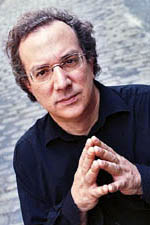> [Archived] Interviews

The George Enescu Festival - Interview with pianist Uri Caine
Monday, September 21st, 19:30, the Small Palace Hall
I have read about your activity and I was impressed by the surprising combination of jazz improvisation and classical music that you manage. Tell me about how you have got here.
Ever since childhood, I've wanted to be a jazz pianist. At about
12, I already knew to play the piano; it was then that I met a teacher
from France, in Philadelphia, where I was living, who encouraged me
to study classical music, even if only to improve my instrumental
technique. From then on, I began practicing various music genres,
but I was especially interested in jazz. I used to listen to a lot
of classical music, as well as rock, funk and electronic. Starting
with this interest in several genres, I discovered a way of improvising
starting from classical music. Beginning with Mahler's or Goldberg's
variations, I wanted to offer musicians who improvise, and who love
classical music at the same time, a new challenge, a means of improvising
on new structures.
Have you found, in the history of music, a genre closer to jazz?
For most musicians, baroque is the closest to jazz because of the
"walking bass", a melodic-harmonic core, which was used
to improvise, just like in jazz. Yet, I believe that the real idea
of jazz is to take an already existing theme - it could be a pop or
folk song or another musical theme - and develop and modify it through
improvisation. While I was young, modern music (Bartok, Stravinsky,
Schoenberg) was a source of inspiration to me, but I was also later
inspired by Beethoven, Chopin, Schumann and Wagner. I was interested
in discovering the structure of the works of these composers.
What structure are you referring to - only the harmonic one or to the entire structure of the songs: harmony, melody, and rhythm?
Naturally, to all of them, but I was particularly interested in musical
forms and the way in which the works had been adapted for orchestra.
I strived to understand what had happened in the history of music,
the influences and the sequence of events. I was interested in various
aspects of music, and I still am, just like many other musicians,
because this is a area where one can learn continuously. The history
of music is so rich, and it is so lovely to compose and perform music,
that I could not do anything else.
Could you name the composer who has inspired you the most in your jazz adaptations?
I could not limit myself to only one of them. For instance, I am
interested in finding out how Stravinsky covered different musical
genres and transformed them. As I evolved from a musical viewpoint,
I became more interested in jazz musicians like Miles Davis, John
Coltrane, Herbie Hancock, and McCoy Tyner.
I know you played, some very many years ago, in a jazz festival
in Bucharest.
Yes, that's right.
What memories do you have from that period?
Well, I came to Romania after the fall of Ceausescu. Back then, there were very interesting times, which I experienced with the greatest emotion, and I think that many were eagerly expecting a change in Romanian society. I did not come with the group I lead, but I performed with Sam River, the saxophone player's band. Definitely it was an interesting experience and I'm looking forward to coming back to Romania, to perform.
Translated by Martin Potter and Sînziana Mihalache
MA Students, MTTLC, Bucharest University
| Team | How do I listen to RRM? | Schedule layout | Partners |
|
Contact Tel: +40-21-3031180, Fax: +40-21-3190552,
E-mail: muzical@radioromania.ro
|














